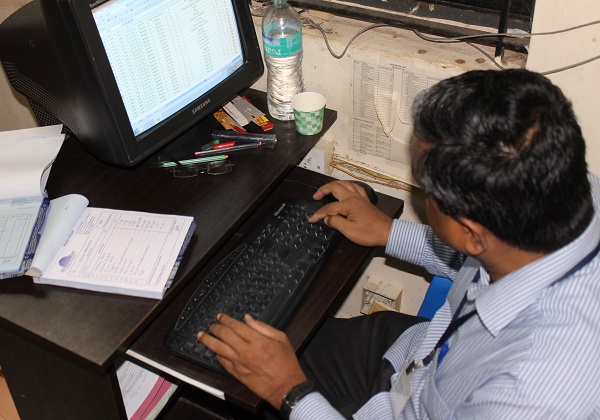Aasha is a Non profit Ngo formed by caregivers/families of persons with mental illness.
Tuesday, May 30, 2017
Recognising the Signs of a relapse of mental illness symptoms while at work.
http://www.patientsengage.com/conditions/5-signs-relapse-mental-illness


5 SIGNS OF RELAPSE OF MENTAL ILLNESS
May 19, 2017

Severe mental illness like Schizophrenia and Bipolar Disorder can get better with appropriate care. But when it begins to raise its disturbing head again in a person, it tends to have a few telltale signs. Tanya Dutt, founder of AtmaNirbhar explains how it is important for an employer to recognise and manage these situations at a workplace.
Work is an important part of our lives and well being and is a key factor in the recovery of a person battling a mental health issue like Schizophrenia. For a person with mental illness, being gainfully employed increases self-esteem,gives a sense of being valued and productive, helps in functionality and forming an identity. In an everyday situation our environment is filled with stress and unpredictability and a person will mental ill health might be vulnerable to certain factors which even with the timely management of the illness, could lead to a relapse of the illness.

Relapses are the return of symptoms of the illness after a period of time when no symptoms are present. Is it possible to circumvent a relapse? As an employer of persons with mental illness, what are the five signs of a relapse to watch out for at the work place and what you could do in these situations.
Five signs that indicate a relapse could be imminent and ways to address these issues
1. Absence from the work place
When the individual who has been fairly regular at work begins to take leave often or refuses to do any work preferring to do nothing for long periods of time, the supervisor should pay attention to signs of distress before the individual completely stops showing up for work.
2. Personal hygiene
When the individual begins to suddenly show up at work in a dishevelled and unkempt manner for several days or if their personal hygiene is lacking, there could be a possibility of underlying distress.
3. Disturbed behaviour
When the individual who has been relatively polite and articulate begins to display signs of aggression or withdraws into extended periods of silence, there is a need to address the situation.
4. Communication lapse
When the individual starts communicating in disjointed sentences, incoherent language or slurry speech, these issues should be addressed immediately.
5. Delusional Thoughts
When the individual begins to verbalise their delusions in an effort to convince everybody around them, the possibility of a relapse is imminent.
How do we deal with this
The Supervisor/Manager must
- Ascertain whether the work environment is conducive to the individual’s performance or whether the individual is either overworked or under motivated to perform his work.
- Ascertain if there is any friction between individual’s relationship with co workers and managers.
- Communicate with the caregivers if required.
- Provide support to the individual to return to work once he gets well.
At any point of time the supervisor/employer should have an open and empathetic line of communication with the individual. When signs of a relapse begin to exhibit the supervisor must be proactive in looking for the source of distress - whether the distress is environmental or organic and provide support as required.
AtmaNirbhar is a non-profit that is focussed on creating gainful employment opportunities for persons with severe mental illness. Atmanirbhar manages four retail stores employing 18 individuals with mental ill health. The recommendations above are based on the experiences at AtmaNirbhar.
The Mental Health Care Act 2017 is a landmark bill that is inclusive and humane. Here are some of the salient points.
http://www.patientsengage.com/news-and-views/know-your-mental-healthcare-act
KNOW YOUR MENTAL HEALTH CARE ACT
In March this year, in a landmark move, the Indian Lok Sabha passed a resolution in favour of those with mental illness. Mr.Amrit Bakhshy, President of Schizophrenia Awareness Association and a caregiver himself lists down some salient points.
The Indian Mental Healthcare Act 2017 strives to rectify years of wrongdoing against those who have a mental illness hallenged and also overturns, in the process, the archaic Section 309 of the Indian Penal Code (which criminalises attempted suicide). The Act, which received President of India’s Assent on 7th April 2017, has been enacted to protect, promote and fulfill rights of persons with mental illness related to mental healthcare and services and matters connected therewith or incidental thereto. Some of the relevant provisions of the Act have been compiled, summarised and classified below:
Rights of Persons with Mental illness
Right to make an Advance Directive
A person shall have the right to make an advance directive (which is not violative of any law of the land) stating how to be treated and how not to be treated for the illness during a mental health situation. (Sections 5 to 13)
Right to appoint a Nominated Representative
A person shall have the right to appoint a nominated representative to take on his/her behalf, all health related decisions (Sections 14 to 17)
Right to access mental health care
A person shall have the right to access to mental health care, treatment and services run or funded by the Government which are affordable, of good quality, in sufficient quantity, available nearby and without any discrimination (Section 18.1 &2)
Right to free services
A Person with Mental Illness (PMI) living below poverty line, a destitute or a homeless, shall get free treatment at state run or funded health establishments. (Section 18.7)
Right to get quality services
The mental health services made available to PMI by the state shall be of the same quality as of general health services. (Section 18.8)
Right to get free medicines
All medicines on the essential drug list shall be made available to PMIs free of cost at the establishments run or funded by the government.
Right to community living
A PMI shall have the right to live in community and be part of and not segregated from society (Section 19.1)
Right to protection from cruel, inhuman and degrading treatment
Every PMI shall be protected from cruel, inhuman or degrading treatment in any mental health establishment (MHE). (Section 20.2)
Right to live in an environment, safe and hygienic, having basic amenities
Every PMI admitted in an MHE shall have a right to safe and hygienic living environment, proper sanitation and facilities for leisure, recreation, education, religious practices and privacy
(Section 20.2.b, c & d)
Right to clothing
Every PMI living in a MHE shall have a right to proper and dignified clothing which prevents exposure (Section 20.2.e)
Right to refuse work and get paid for the work done
No PMI shall be forced to work in an MHE and those who agree to work shall be paid appropriate remuneration for the work done. (Section 20.2.f)
Right to protection
A PMI shall have protection from all forms of physical, verbal, emotional and sexual abuse (Section 20 k)
Right to legal aid
A PMI shall be entitled to receive free legal services to exercise his/her rights available under the Act. (27.1)
Prohibited Procedures/ Practices and Restrictions
No tonsuring
No PMI in an MHE shall be subjected to compulsory tonsuring. (20.2.i)
No compulsion to wear uniforms
A PMI shall not be forced to wear uniform provided by the MHE. (Section 20.2.j)
No discrimination.
There shall be no discrimination on any basis including gender, sex, sexual orientation, religion, culture, caste, social or political beliefs, class or disability. (21.1.a)
No Electroconvulsive Therapy (ECT) without anesthesia
ECT shall not be performed without the use of muscle relaxants and anesthesia. (Section 95.1.a)
Restriction on Electroconvulsive Therapy (ECT) for minors
ECT shall not be performed on minors. In exceptional cases it may be done after getting informed consent of the guardian and prior permission of the Board. (Section 95.1.b and 95.2.)
No sterilization
Sterilization of men or women, intended as a treatment for mental illness, shall not be done.
(Section 95.1.c)
No mechanical restrains
There shall be no chaining a person with mental illness, in any manner or form. (Section 95.1.d)
Restriction on Psychosurgery
Psychosurgery shall not be performed as a treatment for mental illness without obtaining the informed consent of the patient and approval from the Board, (Section 96.1)
Restriction on physical restraints
Physical restrains shall be used sparingly, only when absolutely needed, and are deemed as the least restrictive method. (Section 97.1)
No solitary confinement
Seclusion and solitary confinement is totally banned. (Section 97.1)
Miscellaneous Provisions
A small child to stay with inpatient mother
A woman receiving institutional care shall ordinarily not be separated from her child if the child is below the age of three. (Section 21.2)
Insurance cover for mental illness
Every insurer shall make provision for treatment of mental illness at par with provisions made for physical illness. (Section 21.4)
Emergency Treatment
Any Registered Medical Practitioner can initiate emergency treatment to any person with mental illness if there is threat to self, others, objects or property. (Section 94.1)
Protection to homeless persons with mental illness
Officer I/C of a police station shall take under protection any person found wandering at large within the limits of the police station, if he/she appears to be with mental illness and is incapable of taking care of himself/herself. (Section 100.1.a)
Attempt to commit suicide not an offence
A person who attempts to commit suicide will be presumed to be “suffering from severe stress’’ and shall not be and shall not be subjected to any investigation or prosecution. (Section 115.1)
Persons with mental illness and their families should keep a copy of the Act at home for ready reference and for detailed reading.
Links to the Act:
thttp://www.patientsengage.com/news-and-views/know-your-mental-healthcare-act
Subscribe to:
Comments (Atom)
Students and HOD from Madras School of Social Work visit AASHA
On January 24th 2024, Students and Faculty from MSC Family counselling of The Madras School of Social Work visited AASHA and spent time inte...

-
On January 24th 2024, Students and Faculty from MSC Family counselling of The Madras School of Social Work visited AASHA and spent time inte...
-
AASHA Rehabilitation Home in Selaiyur, Chennai #mentalhealth #rehabilitation #recovery #livingwithdignity
-
I COULD NOT WEATHER THE STORMS THAT INHABIT MY SON'S MIND June 18, 2017 Mr Manuel, 82 shares the journey of his son...

